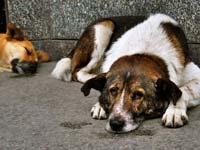Senator wants dog meat probe

Philippines Senator Manuel Villar Jr. is hoping to open an inquiry into the reported prevalence of the illegal dog meat trade to tighten existing animal protection laws.
However, local animal rights activists say it is not enough, arguing that the senator wants to maintain the practice “and not do the right thing by ending dog slaughter altogether.”
Maria Pillar told Bikyamasr.com that “the use of dogs for food is wrong and backward. Just because it was traditional in the country doesn’t mean we should keep it. It was part of our culture to keep women at home, but that has changed.”
Villar has filed a resolution urging the Senate committees on trade and commerce and local government, to hold public hearings on the matter.
“There is an urgent need to end cruelty to animals as espoused in the Animal Welfare Act,” Villar said.
Around 500,000 dogs are slaughtered for sale every year, he said.
The Philippines’ dog meat industry brings in about $4 million CAD annually, according to the nongovernment organization Linis Gobyerno.
Villar said that dog meat has entered into mainstream consciousness and has spawned a dish called “asocena” which is meant to be eaten as a side dish during drinking sessions.
Dog meat eating has existed as a long-standing cultural phenomenon in the Northern provinces of the Philippines, traditionally associated with celebratory events and rituals of mourning.
“Through the years, incidences of illegal dog trading has increased for commercial rather than cultural reasons, as evidenced by numerous raids and seizures initiated by concerned animal rights groups in cooperation with local police authorities,” Villar said.
He noted that the Philippine Animal Welfare Act of 1998 states that ”it shall be unlawful for any person to torture any animal, to neglect to provide adequate care, sustenance or shelter, or maltreat any animal or to subject any dog or horse to dogfights or horsefights, kill or cause or procure to be tortured or deprived of adequate care, sustenance or shelter, or maltreat or use the same in research or experiments not expressly authorized by the Committee on Animal Welfare.”
It is provided in the same law that the killing of any animal other than cattle pigs, goats, sheep, poultry, rabbits, carabaos, horses, deer and crocodiles “is likewise declared unlawful.”
Villar said that rescued dogs bound for makeshift slaughterhouses were found with their front paws tied behind their backs and their muzzles gagged with a nylon cord or in rusty tin cans which cause their tongues to be swollen.






